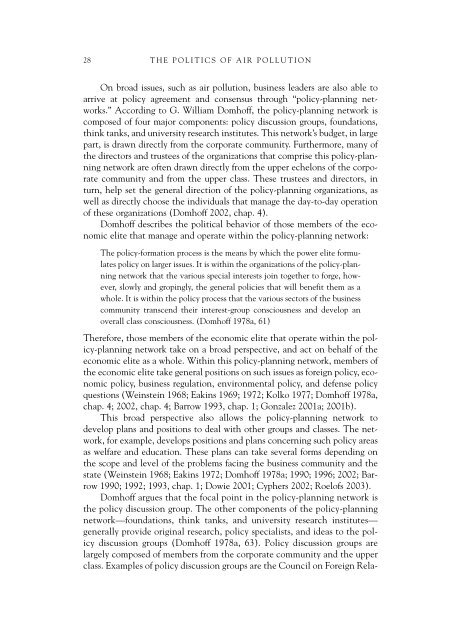THE POLICYMAKING PROCESS 27Given industries’ economic clout, ranging from honoraria paid to members tocampaign contributions, one might expect that lobbyists could have freelyworked their will in the legislative process. But business lobbying is rarely, ifever, united, since competitive pressures cut in many different directions. (135)ECONOMIC ELITE THEORYWhile plural elite theorists describe how individual corporate decision makersdominate specific and narrow policy areas, economic elite theorists contendthat these corporate decision makers, along with other individuals ofwealth, develop and impose broadly construed policies on the state. Additionally,while plural elite theory views the business community as sociallyand politically fragmented, proponents of the economic elite model hold thatthe owners and leadership of this community can be most aptly characterizedas composing a coherent social and political unit or class.As I noted in the preceding chapter, Clyde Barrow (1993) points outthat “typically, members of the capitalist class [or the economic elite] areidentified as those persons who manage [major] corporations and/or ownthose corporations.” He adds that this group composes no more than 0.5 to1.0 percent of the total U.S. population (17). 6 This group as a whole is theupper class and the upper echelon of the corporate or business community.The resource that members of the economic elite possess that allows them toexercise a high level of influence over government institutions is wealth. Thewealth and income of the economic elite allow it to accumulate superioramounts of other valuable resources, such as social status, deference, prestige,organization, campaign finance, lobbying, political access, and legal and scientificexpertise (Barrow 1993, 16).Within the economic elite model, despite the segmentation of the economicelite along lines that are related to their material holdings, most policydifferences that arise due to differences in economic interests can and aremediated. There are social and organizational mechanisms that exist thatallow business leaders to resolve difficulties that develop within a particularsegment and between different segments of the corporate community. Forspecific industries, or for disagreements between different industries, trade orbusiness associations can serve as organizations to mediate corporate conflict.Social institutions, such as social and country clubs, can also serve as meansthrough which to develop political consensus among the upper echelon ofthe business community on various economic, political, and social issues(Domhoff 1974). Michael Useem (1984), based on his extensive study oflarge American and British corporations, argues that corporate directors whohold membership on more than one board of directors tend to serve as ameans through which the corporate community achieves consensus on variouspolitical issues (also see Mintz and Schwartz 1985).
28THE POLITICS OF AIR POLLUTIONOn broad issues, such as air pollution, business leaders are also able toarrive at policy agreement and consensus through “policy-planning networks.”According to G. William Domhoff, the policy-planning network iscomposed of four major components: policy discussion groups, foundations,think tanks, and university research institutes. This network’s budget, in largepart, is drawn directly from the corporate community. Furthermore, many ofthe directors and trustees of the organizations that comprise this policy-planningnetwork are often drawn directly from the upper echelons of the corporatecommunity and from the upper class. These trustees and directors, inturn, help set the general direction of the policy-planning organizations, aswell as directly choose the individuals that manage the day-to-day operationof these organizations (Domhoff 2002, chap. 4).Domhoff describes the political behavior of those members of the economicelite that manage and operate within the policy-planning network:The policy-formation process is the means by which the power elite formulatespolicy on larger issues. It is within the organizations of the policy-planningnetwork that the various special interests join together to forge, however,slowly and gropingly, the general policies that will benefit them as awhole. It is within the policy process that the various sectors of the businesscommunity transcend their interest-group consciousness and develop anoverall class consciousness. (Domhoff 1978a, 61)Therefore, those members of the economic elite that operate within the policy-planningnetwork take on a broad perspective, and act on behalf of theeconomic elite as a whole. Within this policy-planning network, members ofthe economic elite take general positions on such issues as foreign policy, economicpolicy, business regulation, environmental policy, and defense policyquestions (Weinstein 1968; Eakins 1969; 1972; Kolko 1977; Domhoff 1978a,chap. 4; 2002, chap. 4; Barrow 1993, chap. 1; Gonzalez 2001a; 2001b).This broad perspective also allows the policy-planning network todevelop plans and positions to deal with other groups and classes. The network,for example, develops positions and plans concerning such policy areasas welfare and education. These plans can take several forms depending onthe scope and level of the problems facing the business community and thestate (Weinstein 1968; Eakins 1972; Domhoff 1978a; 1990; 1996; 2002; Barrow1990; 1992; 1993, chap. 1; Dowie 2001; Cyphers 2002; Roelofs 2003).Domhoff argues that the focal point in the policy-planning network isthe policy discussion group. The other components of the policy-planningnetwork—foundations, think tanks, and university research institutes—generally provide original research, policy specialists, and ideas to the policydiscussion groups (Domhoff 1978a, 63). Policy discussion groups arelargely composed of members from the corporate community and the upperclass. Examples of policy discussion groups are the Council on Foreign Rela-
- Page 2: The Politics of Air Pollution
- Page 7: ContentsAcknowledgmentsviiONELocal
- Page 12 and 13: LOCAL GROWTH COALITIONS 3tion, such
- Page 14 and 15: LOCAL GROWTH COALITIONS 5how the U.
- Page 16 and 17: LOCAL GROWTH COALITIONS 7growth (Ta
- Page 18 and 19: LOCAL GROWTH COALITIONS 9In this pe
- Page 20 and 21: LOCAL GROWTH COALITIONS 11ity tend
- Page 22 and 23: LOCAL GROWTH COALITIONS 13In the ar
- Page 24 and 25: LOCAL GROWTH COALITIONS 15who reduc
- Page 26 and 27: LOCAL GROWTH COALITIONS 17cally mod
- Page 28 and 29: TWOPolitical Economy and thePolicym
- Page 30 and 31: THE POLICYMAKING PROCESS 21moves to
- Page 32 and 33: THE POLICYMAKING PROCESS 23eral gov
- Page 34 and 35: THE POLICYMAKING PROCESS 25groups
- Page 38 and 39: THE POLICYMAKING PROCESS 29tions, t
- Page 40 and 41: THE POLICYMAKING PROCESS 31the Conf
- Page 42: THE POLICYMAKING PROCESS 33lars 199
- Page 45 and 46: 36THE POLITICS OF AIR POLLUTIONCOAL
- Page 47 and 48: 38THE POLITICS OF AIR POLLUTIONa go
- Page 49 and 50: 40THE POLITICS OF AIR POLLUTIONrush
- Page 51 and 52: 42THE POLITICS OF AIR POLLUTIONattr
- Page 53 and 54: 44THE POLITICS OF AIR POLLUTIONScot
- Page 55 and 56: 46THE POLITICS OF AIR POLLUTIONthe
- Page 57 and 58: 48THE POLITICS OF AIR POLLUTIONcrit
- Page 59 and 60: 50THE POLITICS OF AIR POLLUTIONwhen
- Page 61 and 62: 52THE POLITICS OF AIR POLLUTIONin t
- Page 63 and 64: 54THE POLITICS OF AIR POLLUTIONThe
- Page 65 and 66: 56THE POLITICS OF AIR POLLUTIONfirm
- Page 67 and 68: 58THE POLITICS OF AIR POLLUTIONinno
- Page 69 and 70: 60THE POLITICS OF AIR POLLUTIONThe
- Page 71 and 72: 62THE POLITICS OF AIR POLLUTIONFHA
- Page 73 and 74: 64THE POLITICS OF AIR POLLUTIONgone
- Page 75 and 76: 66THE POLITICS OF AIR POLLUTIONPres
- Page 78 and 79: FIVEThe Establishment ofAutomobile
- Page 80 and 81: AUTOMOBILE EMISSION STANDARDS 71ext
- Page 82 and 83: AUTOMOBILE EMISSION STANDARDS 73Ano
- Page 84 and 85: AUTOMOBILE EMISSION STANDARDS 75the
- Page 86 and 87:
AUTOMOBILE EMISSION STANDARDS 77thr
- Page 88 and 89:
AUTOMOBILE EMISSION STANDARDS 79was
- Page 90 and 91:
AUTOMOBILE EMISSION STANDARDS 81exp
- Page 92 and 93:
AUTOMOBILE EMISSION STANDARDS 83acc
- Page 94 and 95:
AUTOMOBILE EMISSION STANDARDS 85Thu
- Page 96 and 97:
AUTOMOBILE EMISSION STANDARDS 87A n
- Page 98 and 99:
SIXDemocratic Ethics,Environmental
- Page 100 and 101:
DEMOCRATIC ETHICS 91At the core of
- Page 102 and 103:
DEMOCRATIC ETHICS 93senior attorney
- Page 104 and 105:
DEMOCRATIC ETHICS 95ments mount cha
- Page 106 and 107:
DEMOCRATIC ETHICS 97frameworks, as
- Page 108 and 109:
DEMOCRATIC ETHICS 99mobiles and gas
- Page 110 and 111:
DEMOCRATIC ETHICS 101the ecological
- Page 112 and 113:
CONCLUSIONPolitical Power andGlobal
- Page 114 and 115:
CONCLUSION 105quality became manife
- Page 116:
CONCLUSION 107lation, the U.S. econ
- Page 119 and 120:
110THE POLITICS OF AIR POLLUTIONCHA
- Page 121 and 122:
112THE POLITICS OF AIR POLLUTION6.
- Page 123 and 124:
114THE POLITICS OF AIR POLLUTION4.
- Page 126 and 127:
BibliographyAcher, Robin. 2001. “
- Page 128 and 129:
BIBLIOGRAPHY 119Brienes, Marvin. 19
- Page 130 and 131:
BIBLIOGRAPHY 121Cole, Luke W., and
- Page 132 and 133:
BIBLIOGRAPHY 123——— . 2002. W
- Page 134 and 135:
BIBLIOGRAPHY 125——— . 1975.
- Page 136 and 137:
BIBLIOGRAPHY 127Hayward, Clarissa R
- Page 138 and 139:
BIBLIOGRAPHY 129——— . 2001. E
- Page 140 and 141:
BIBLIOGRAPHY 131——— . 1988.
- Page 142 and 143:
BIBLIOGRAPHY 133Perez-Pena, Richard
- Page 144 and 145:
BIBLIOGRAPHY 135Runte, Alfred. 1997
- Page 146 and 147:
BIBLIOGRAPHY 137Tarr, Joel A. 1996.
- Page 148:
BIBLIOGRAPHY 139Wiewel, Wim, and Jo
- Page 151 and 152:
142THE POLITICS OF AIR POLLUTIONChi
- Page 153:
144THE POLITICS OF AIR POLLUTIONTuc









